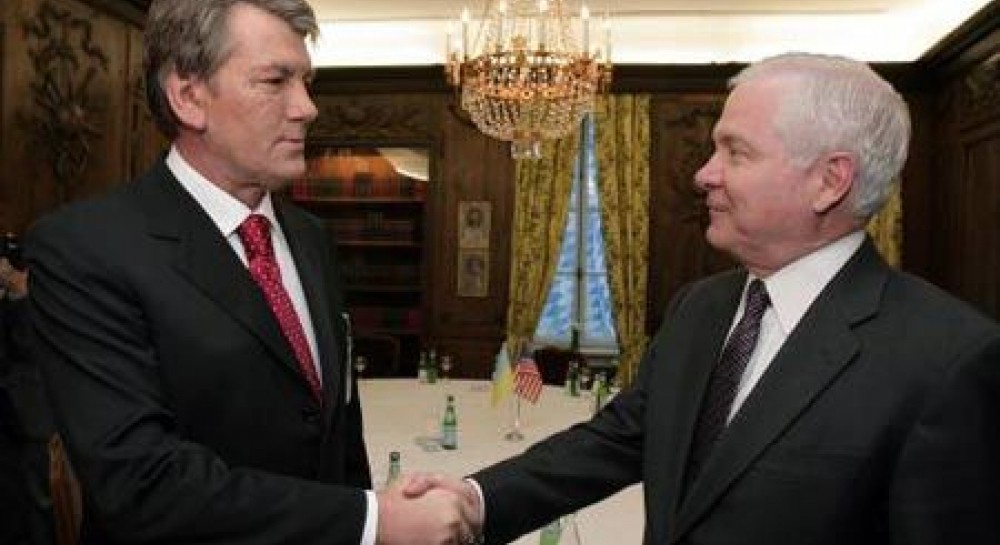
Ukraine may finally get nod from NATO
Not just alliance membership, but the tone of relations between Russia and the West will be on the table when Defense Secretary Robert Gates joins NATO defense ministers in Estonia to discuss how to bring Ukraine...
When the presidents and prime ministers of every NATO nation met in Bucharest, Romania, in April, they agreed unanimously that Ukraine and Georgia, two former Soviet republics, would someday, without a doubt, enter the Western alliance.
But in the face of Russian resistance and even some recalcitrance within the alliance, the leaders could not agree to formally invite either Ukraine or Georgia to the ritual of requirements, reforms and deadlines. It was the diplomatic equivalent of proposing marriage without setting the wedding day. And it was a notable rejection of American policy, which had long sought to begin the formalities of the engagement, known in NATO parlance as a Membership Action Plan.
Instead, an ad hoc coalition of longtime NATO members — Germany, France, Italy and Spain — continued to block the desires of Washington and the newer members of Central and Eastern Europe to bring the two countries into the fold.
Not just alliance membership, but the tone of relations between Russia and the West will be on the table on Wednesday and Thursday when Defense Secretary Robert Gates joins NATO defense ministers in Estonia, a tiny republic adjoining Russia`s Baltic coast, to discuss how to bring Ukraine, at least, rapidly into the alliance.
Gates and allies pushing Ukraine`s membership agree that the war between Russia and Georgia in August gave them more evidence of the need for shoring up NATO`s commitments.
"I`m not so sure this is a meeting the secretary would have attended had the Russians chosen not to invade Georgia," said Geoff Morrell, the Pentagon press secretary. "But in the aftermath of that, the secretary wanted to send a very strong signal of his support for Ukraine and the Baltic states and our other NATO allies from Eastern Europe that the United States stands firmly behind them."
At the same time, however, the debate over "Who shot first?" in the war between Russia and Georgia reaffirmed the views of those allies that want to slow membership, especially for Georgia. As details emerge that point to provocative, perhaps even foolhardy behavior by Georgia`s leadership, some NATO-nation diplomats are relieved that Georgia was not in the alliance.
Under the NATO charter, an attack on one ally requires all to rise to its defense. In the case of the August conflict, had Georgia been a NATO member, the alliance could have been pulled into war with Russia.
Only Ukraine`s membership is on the agenda this week at the special session of NATO defense ministers. To be sure, Ukraine is a special case, for the alliance and for Russia.
With a population of 46 million, and vast agricultural and industrial resources, Ukraine is set strategically between Russia and the newer NATO members that were formerly separate nations under Moscow`s hegemony in the Warsaw Pact. Ukraine would be the largest and most important former Soviet republic to enter the alliance. The three Baltic states of Estonia, Latvia and Lithuania, which became Soviet republics during World War II, never had such political, economic and cultural ties to Russia itself.
That helps explain why Russia reluctantly accepted NATO membership for its former Warsaw Pact partners, and even for the Baltic states — but has drawn a line at Ukraine.
"Russia has issued all kinds of threats and warnings," said a senior administration official who, like other policy makers, agreed to discuss the NATO session in advance under customary diplomatic ground rules of anonymity.
To counter those warnings, the Bush administration, in its final days, will make the case to the Kremlin that Ukraine`s entry into NATO is a decision to be made by Ukrainians, and is not a threat to Russia.
"These are people making choices about their own future," said another senior United States government official. "This is not encirclement of Russia. This is not a NATO strategy going against Russian interests."
While in Estonia, NATO defense ministers will discuss how to push Ukraine`s military toward requirements for membership, including transparency in budgeting and movement toward a professional military.
"We have to take a `tough love` approach with Ukraine," said another senior official. "It is clear that they need to deliver on reforms — not just military reforms, but democratic reforms. Their government appears to be in a perpetual state of crisis. There is a lot for them to do."
A formal decision on offering a Membership Action Plan to Ukraine awaits alliance foreign ministers meeting in Brussels next month, and there is no evidence that those allies wishing to slow Ukraine`s membership have altered their view. The issue will turn on domestic politics in the United States as much as in Ukraine.
The Bush administration has invested heavily in NATO membership for Ukraine. President George W. Bush stopped there en route to the April alliance summit. After the conflict between Georgia and Russia, Vice President Dick Cheney visited Georgia and Ukraine in September to express the administration`s continued support for the quick entry of both countries into the alliance.
President-elect Barack Obama, who has said there is only one president at a time, is not expected to make clear his official views on NATO expansion or Washington`s relations with Russia until after Inauguration Day on Jan. 20.
Election politics are adding uncertainty in Ukraine, as well.
Yulia Tymoshenko, the prime minister, and Viktor Yushchenko, the president, are former allies now in a bitter power struggle, with new elections possible in mid-December — within days after the NATO foreign ministers` session.
Leadership during the current financial crisis is central to the vote, but Yushchenko has also adopted a tougher approach toward Russia than Tymoshenko. He is pushing for NATO membership, while Ukraine`s population, 17 percent of them ethnic Russians, is divided on the issue.

